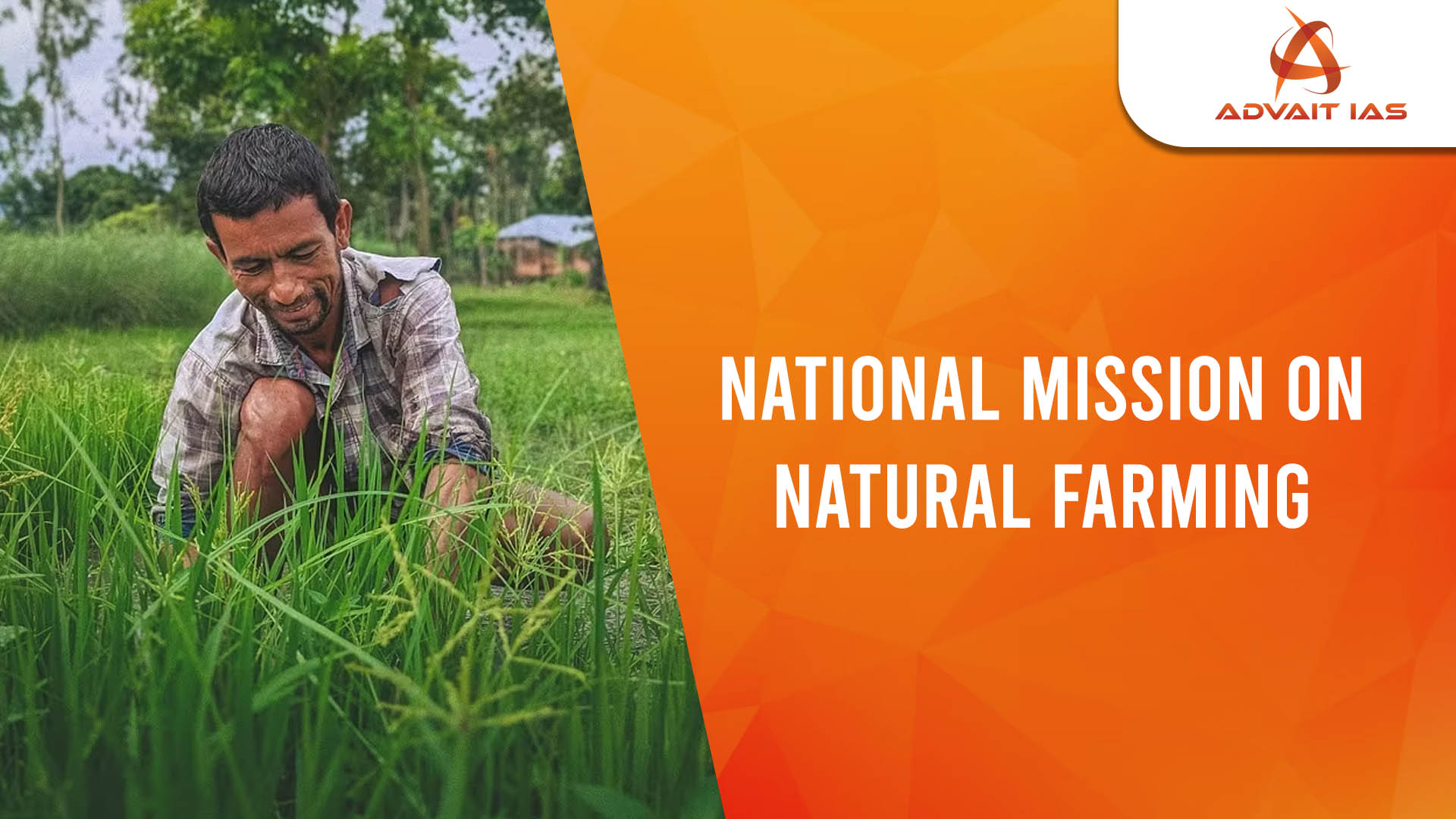The Union Cabinet approved the launch of the National Mission on Natural Farming (NMNF) as a centrally sponsored scheme under the Ministry of Agriculture & Farmers’ Welfare.
Natural Farming
Natural farming is a chemical-free, sustainable agricultural practice that relies on natural inputs like Jeevamrit (liquid fertilizer) and Beejamrit (seed treatment) derived from livestock resources.
Key Features of the National Mission on Natural Farming (NMNF)
- Model Demonstration Farms:
-
- Establishment of 2,000 Model Demonstration Farms at Krishi Vigyan Kendras (KVKs), Agricultural Universities (AUs), and farmers’ fields.
- These farms will serve as training grounds and examples for farmers to adopt natural farming practices.
- Training and Awareness:
-
- Farmer Master Trainers will train willing farmers in natural farming practices.
- 30,000 Krishi Sakhis will be deployed for awareness generation, mobilization, and handholding of farmers in clusters.
- Preparation of Inputs:
-
- Trained farmers will prepare natural farming inputs such as Jeevamrit (a natural liquid fertilizer) and Beejamrit (a seed treatment solution) using livestock-based resources.
- Financial Outlay:
-
- Total budget: ₹2,481 crore.
- Central Government Contribution: ₹1,584 crore.
- State Contribution: ₹897 crore.
- Implementation Targets:
-
- 15,000 clusters in Gram Panchayats will be developed over the next two years.
- Aims to reach 1 crore farmers to initiate natural farming practices.
- Area Coverage:
-
- The mission targets an additional 5 lakh hectares under natural farming.
- Focus on regions with high fertiliser use and along the Namami Gange
- Certification and Branding:
-
- Establishment of scientifically supported certification standards.
- Creation of a single national brand for naturally grown chemical-free produce.
- Sustainability Goals:
-
- Focus on rejuvenating soil health, improving soil fertility and quality.
- Building resilience to climate risks like waterlogging, floods, and droughts.
- Reducing health risks from excessive use of fertilisers and pesticides.
About Zero Budget Natural Farming (ZBNF)
ZBNF is a farming method developed by Subhash Palekar in India that promotes chemical-free and low-cost agriculture, focusing on self-sustaining natural processes.
Key Features of ZBNF
- Zero Budget:
-
- Eliminates the need for external inputs like chemical fertilizers or pesticides.
- Relies entirely on resources available on the farm.
- Natural Farming Practices:
-
- Focuses on soil health and biodiversity using natural methods.
- Avoids any external organic or inorganic products.
- Four Pillars of ZBNF:
-
- Jeevamrutha: A microbial culture made of cow dung, cow urine, jaggery, and soil to enrich the soil.
- Bijamrutha: A seed treatment using natural ingredients to protect seeds from pests and diseases.
- Acchadana (Mulching): Covers the soil to preserve moisture, prevent weed growth, and enhance fertility.
- Waaphasa (Soil Aeration): Maintains adequate soil aeration to prevent waterlogging and support root health.
- No Tillage or Chemical Inputs:
-
- Prevents soil disturbance and avoids chemical intervention for pest or weed control.
- Cost Efficiency:
-
- Reduces farming costs, making it ideal for small and marginal farmers.
- Water Conservation:
-
- Encourages practices that retain soil moisture, reducing water dependency.
- Focus on Indigenous Cattle:
-
- Promotes the use of local cow breeds for dung and urine, essential for Jeevamrutha preparation.
- Sustainability:
-
- Encourages ecological balance and long-term soil fertility.
- Environment-Friendly:
-
- Reduces pollution and mitigates the harmful effects of chemical fertilizers and pesticides.
- Health Benefits:
-
- Produces chemical-free, nutritious crops, contributing to better consumer health.
Difference Between Organic and Natural Farming
| Aspect | Organic Farming | Natural Farming |
| Definition | Uses organic inputs like compost and bio-pesticides. | Avoids all external inputs, relying on natural cycles. |
| Inputs | Organic fertilizers and bio-pesticides are used. | No fertilizers or pesticides; fully ecosystem-driven. |
| Philosophy | Certified sustainable farming method. | Harmony with nature; no certification needed. |
| Soil Fertility | Maintained with organic manure and compost. | Built naturally through mulching and cover crops. |
| Water Use | May require more water. | Promotes natural moisture retention, less water needed. |
| Cost & Yield | Higher costs, better yields. | Low costs, yields may be lower initially. |






